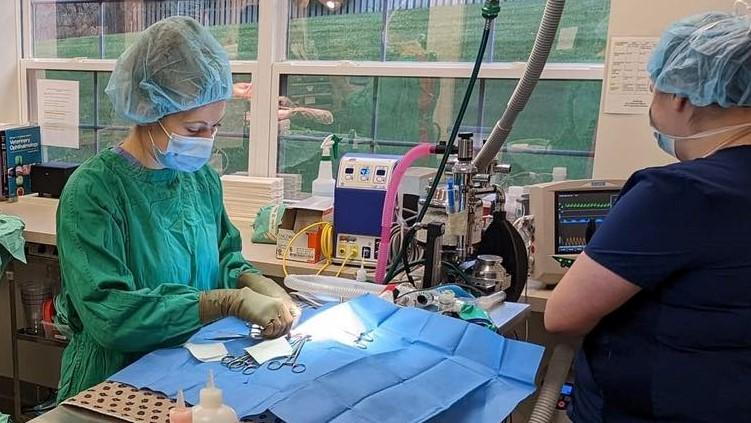When and Why Should I Spay or Neuter my Pet?

- posted: Feb. 25, 2024
When and Why Should I Spay or Neuter my Pet?
Besides the obvious attempt to reduce pet overpopulation, why should you spay or neuter your pet? Intact pets can experience a number of medical and behavioral problems, so there can be health benefits. However, guidelines on when to neuter your pet have changed a bit in recent years. Let’s look at some pros and cons of spay/neuter and the best age for surgery.
First, the boys. Older male dogs can experience prostate enlargement which may cause difficulty urinating. Intact males also have an increased risk of prostate infection. There is also increased risk of perianal hernias (a serious condition in which an opening of the muscle layers next to the anus can cause the bladder or other organs to become trapped) and tumors around the anus or, less commonly, testicular tumors, if not neutered. Male cats do not have many health issues if left intact, but their urine develops an extremely strong, unpleasant odor and they are more likely to mark territory by spraying urine. Neutering cuts down on these undesirable behaviors. Intact male cats also have a higher risk of bite wounds from fighting, FIV infection and of being hit by a car.
Now, the girls. One life threatening problem that may develop is a condition called pyometra. Pyometra literally means pus-filled uterus. The dog’s or cat’s uterus becomes infected and, if the uterus is not removed, the pet can go into shock and die or pus can fill the abdomen causing peritonitis. Females are also at risk of developing breast tumors as they get older if they are not spayed when young. About 50% of breast tumors found in mature female dogs are cancerous and 85% of those found in cats are cancerous. To a lesser degree, females may also develop ovarian or uterine tumors.
Of course, minor complications such as post-op infections, suture reaction, incisions opening or not healing well and minor risks associated with anesthesia can occur but are typically minimal with spay/neuter surgeries.
The issue of when and why to spay/neuter has become a bit more complicated as new studies show that spaying and neutering pets very early in life could potentially cause other health risks like skeletal problems, especially in large and giant breed dogs. Early spay and neuter of large breed dogs may cause delayed closure of growth plates resulting in longer, thinner bones and may increase certain types of musculoskeletal injuries such as cruciate ligament tears. Large bred females may also have a higher incidence of urinary incontinence if spayed before their first heat cycle. It is also possible that spaying or neutering at a later age may reduce the risk of certain types of cancer, though this data is inconclusive at this time and more studies are definitely needed.
Are there any cons to waiting? If your pet is displaying any aggressive tendencies or urine marking behaviors, spaying or neutering earlier may be beneficial. Spaying females after their first heat may lead to a slight increase in development of mammary tumors as opposed to spaying before a first heat. Having intact male and female dogs in the same household could result in unwanted breeding, so spaying or neutering before sexual maturity would be recommended in this situation. Finally, there may be personal reasons for wanting your dog to be spayed or neutered early, such as not wanting them to deal with the mess of a dog in estrus, cost concerns or other issues.
The best plan is to discuss pros and cons of spaying or neutering your pet and the best age at which to do so with your veterinarian. Find out what works best for your pet’s lifestyle and for your family. Patton Veterinary Hospital has adopted the recommendation of waiting until the age of twelve to eighteen months to spay or neuter pets who will be over 50lbs as adults. With females, waiting until 12 months or older will result in at least one heat cycle. Smaller dogs and cats can still be altered at four to six months of age. Shelter medicine guidelines may differ.
This blog brought to you by the Patton Veterinary Hospital serving Red Lion, York and the surrounding communities.
Source: https://www.cliniciansbrief.com/article/age-neutering-large-giant-breed-dogs
Location
Patton Veterinary Hospital
425 E Broadway
Red Lion, PA 17356
